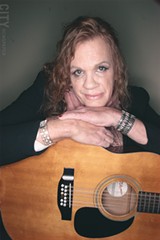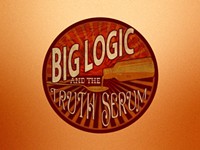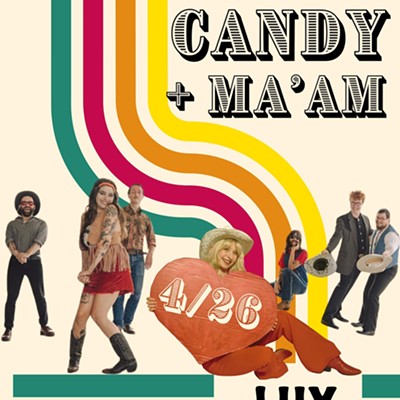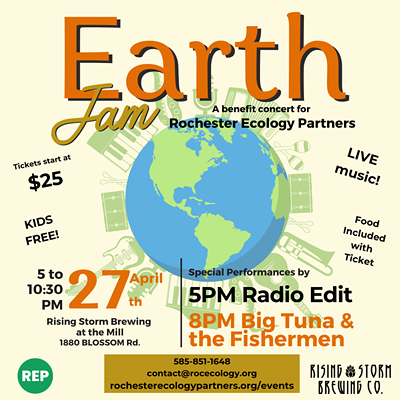
[
{
"name": "500x250 Ad",
"insertPoint": "5",
"component": "15667920",
"parentWrapperClass": "",
"requiredCountToDisplay": "1"
}
]
At any given time, Cora Treoir Duncan has no less than 100 CDs cluttering her car. She's a voracious music fan devouring anything from The Byrds and The Bee Gees to Neko Case. She is a longtime musician as well. And whenever the discussion revolves around music — found in piles in the backseat or live on stage at some club du jour — she speaks in excited tones.
Cora surrounds herself with music. It has helped define her as she has sought to define herself.
It was late winter 2015 and long-time Rochester scenester Duncan Walls rattled the local music scene's walls with an announcement. It turns out the Duncan we in the music community all knew was simply a male façade she had been hiding behind, a closet from which Duncan would finally emerge — now as a woman. Enter Cora Treoir Duncan.
Some saw it coming, while others were blindsided, including to a certain extent, Cora herself, who had struggled with her gender identity for most of her 64 years. When the scene heard word, and that word started to spread, the ignorance and fear that Cora anticipated simply wasn't there. People were more than willing to welcome her — though they initially may have seen it as losing Duncan. In the end people realized they hadn't lost a friend but rather gained a truer, more accurate and honest edition of the one they'd always had.
Suffice it to say, people were taken slightly aback. There were questions; there was confusion. Yet moreover, there was an abundance of acceptance and open arms tossed in with a pressing need to understand. Longtime friends who were used to calling her Duncan had a hard time switching the pronoun from "him" to "her." But Cora's popularity, candor, and honesty, with herself as well as with those around her, has eased any awkwardness and given voice to other transgender women.
Through her outspoken nature, high visibility on Facebook, and shows around town, Cora has put a face to transgender issues, in particular in the music scene. It's all part of being Cora.
"I am very blessed with the music community locally," Cora says. "A lot of people knew about me before I did. There were a lot of people who weren't surprised when I came out — like my sister, who said, 'You're on the edge of music; you're on the edge of literature, culture. What took you so long?'"
Cora's long journey began when she was a child, "probably before kindergarten," she says, "messing around in my mother's clothes, putting them on, watching how she did it."
"I also remember looking at pictures of Christine Jorgensen in Life magazine when I was 4 or 5," she adds.
Cora was born Duncan Burnie Walls in 1951, at a time when society and science were limited in the study and understanding of gender identity. It was all twisted up and mired in denial, ignorance, and fear. It was the dark ages, especially for young Duncan whose hormones told her one thing and society told her another.
"When I was about 8 years old, my testicles didn't descend," Cora says. "Which should have been a sign." There were painful procedures they tried multiple times "that felt like a golf ball through a garden hose ... My parents didn't know what to do, frightened. They took me to the doctor. He didn't know what to do. They sent me to a specialist here in Rochester who, for two years, gave me injections of estrogen twice a month. I was a science experiment. He thought it was going to produce a reaction and send my testicles down. He didn't know what he was doing."
But according to Cora, it did produce a reaction.
"Well, I couldn't stay out of my mother's clothes after that," she says. "And what 8-year-old wants to sneak around and not be seen? It was soon found out. So for two years, I took the shots and things got way out of hand. I was virtually untouchable; jumpy all the time. My body was at war with itself and my parents couldn't stand that either. They were both smart people, college educated. They were scared, didn't know what to do. There were no books out there to help them. So we went back for a second opinion with an urologist who, when I was in the fifth grade, surgically brought my testicles down. I went from 50 pounds to 95 pounds that school year and grew 17 inches. Everything changed after that."
Cora says thankfully the process has gotten better.
"Trans kids today," she says, now have the option to use "hormone blockers until they're 16 and then let them decide as adults. Occasionally a few, they would let jump the gun if they were really committed. They had to be insistent, persistent, and consistent in their behavior." As Duncan, Cora was not — she was consumed with curiosity and doubt. Determined to understand her own sexuality, the teenage Duncan began to seek answers on her own. She found none. There were no answers. It just seemed to get worse.
"By the time I was 12," she says, "I was going down to the public library, or the old Clinton Book Shop, and I would rummage around the books. And I found a book called Psychopathia Sexualis by Richard von Krafft-Ebing which was a very dense medical tome from the early-20th century, where everything that was deviant, perverse, abnormal, aberrant about sexuality ... I found nothing positive. So I had to lie to survive. I had to pretend. I had to hide everything and I cross dressed the rest of my life."
It was her secret alone, to a certain extent.
"I always came out or at least gave a strong indication as to what was going on to all the women who were partners in my life," Cora says. "1975-1985 I was extremely promiscuous. I had maybe 75 partners, I was just hyper masculine, overcompensating, trying to prove ... trying to live up to my genitalia."
As with many cases of transgender or gender confirmation, some confuse it with homosexuality.
"No," she says. "Plenty of straight males have cross-dressed once in a while. But this was more than that for me; it really was. Because it was how I pictured myself and how I wanted to be, but I didn't know it then. And it was a life of shame and guilt and I just thought it was wrong and perverse and I was a bad person. I bit my nails to the quick. I just didn't like myself. I told my girlfriends and wives — I was married three times — and generally it was viewed as a fetish that needed to be put up with. There was one girl that absolutely loved it and I had the best sex of my life with her, but I pushed her away. If she supported me, I thought, where would I go? It was just fear."
Cora describes life then as "hiding in plain sight." And she pulled it off as a musician, the lead singer in bands, a DJ in clubs, and as a record store fixture for almost 30 years. Still there was the glimmer of her secret beneath the charade.
"Lead singers dress up all the time," she says. "I was wearing make-up in the 1980's in Don't Call Me Junior. I'd change my outfit three times a show; wear vintage clothes that were androgynous. I kept playing around the edges of it."
There were still core aspects of Cora's life that even she didn't understand or know how to address. Technology stepped in.
"When the Internet came along in the late 1990's," Cora says. "I joined a local cross dressers' club and started to look into it a bit more seriously after my second marriage failed. There's this thing, you know, the perfect woman comes along and you think maybe she can cure it. And I thought my third wife would, I really did."
But then again, Cora wasn't entirely sure a "cure" was what she needed.
"I didn't know," she says. "It's very confusing; you get mixed signals. You certainly get them from society, from those you know and love, from culture, movies ... As my third marriage dissolved, by mutual admission, I thought, 'I don't want to be unhappy the rest of my life. I want to find out about this.' So I went online and found a gender therapist. I thought I've got to talk to somebody about this because I've got to know. It's been the elephant in the room for some time. I was afraid to look at it."
"Oh please, yes," Cora says when asked if she regrets not looking into it sooner. "And I wish my parents had kept the course with hormones when I was a little one."
Since coming out last year, Cora has received an outpouring of support. She in turn runs a Facebook page for support of transgender people, and as a high profile character on the scene serves as an advocate for transgender women who have unanswered questions and no voice. Cora boils it down.
"Our sex organs say we're males," she says. "But it's my contention — it's our contention — that we've always been women. We just have a birth defect."
And whereas Cora has embraced her new life, she's also strongly considering taking steps toward the physical commitment as well.
"I'd like to do the actual gender reassignment — or gender confirmation as we sometimes call it — within the next couple years," she says. This includes steps to eliminate her masculine features, in particular, her penis.
"These past few years it's been painful, quite frankly, to have sex," she says. "So yes, I do want to do it. It just feels right to me. Gender expression is how I dress. Part of it is who you are, who you want to go to bed with. My therapist asked me, 'Can you imagine life without a penis?' I thought about it for a week. It's like having a dictator in your life. I'm willing to end the tyranny of the penis in my life. I don't like it."
Though not intentional, or malicious for the most part, some misperceptions persist. Cora abides.
"People think that it's all about sex," she says. "It isn't. One of the questions even my oldest and dearest friends will ask, 'So does this mean you're gay now?' No. I'd rather be with women, because I relate very heavily to women, always have. I had to realize at one point as much as I wanted to be with these women, I wanted to be them. I was always drawn to strong feminine energy."
Cora wears make-up, has her hair done and sashays into the room with confidence and invigorated flair. The commitment to femininity has crossed over to her songwriting as well.
"It's funny," she says, "in every song I've written — four or five completed and the fragments of 20 or 30 others — I don't write ambiguously anymore. That was always a problem when I wrote. I always had trouble finishing a song because it never seemed like I could say what I really wanted to say. I sort of straddled the fence. I wasn't consciously doing it; I was driven to do it. Now, I write from one truth. It's unambiguous, it's unapologetic. I just write and I'm very happy with what I'm writing.
Cora hopes to do a show next year of new songs inspired by her transition. She describes the songs are more focused and stronger — a reflection of how she feels personally.
"Music has kept me sane during the last two years of transition," Cora says. "It supported my emotional trials by matching the sadness, the pain, the fear and anger and eventually the joy. It's amazing how a song as innocent as 'Georgy Girl' by The Seekers would speak to me in no uncertain terms about my own femininity. Or Joni Mitchell's 2002 re-do of 'Both Sides Now' would bring me to tears again and again."
Cora's next step is getting body and soul on the same page. She embraces it with grace and patience. And she finds peace in the chaos of her job working for the state in a group home for developmentally disabled adults and the serenity in the honesty coming out has afforded her.
"The next 20 years are going to be the best years of my life," she says.
You can sum it all up in the dichotomy of her name.
"Duncan means 'warrior,'" she says. "Treoir means 'guide.' And Cora (my mother's name) means 'young maiden' in Greek. But in Gaelic means 'seething pool.' I said, 'Perfect. I'm a warrior, I'm a guide, and I'm a seething pool. That's it. That's me."'
Speaking of...
-

Rochester musicians remember their first instruments
Dec 1, 2020 -

The F Word: What's your side hustle?
Apr 14, 2020 -

The F Word: Clap hands
Apr 6, 2020 - More »









